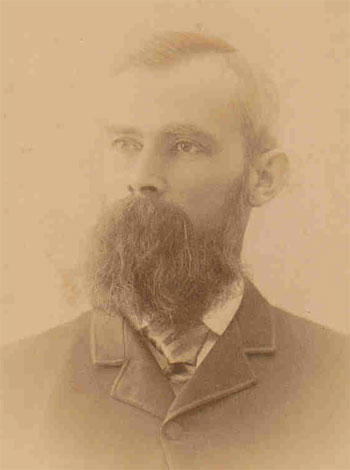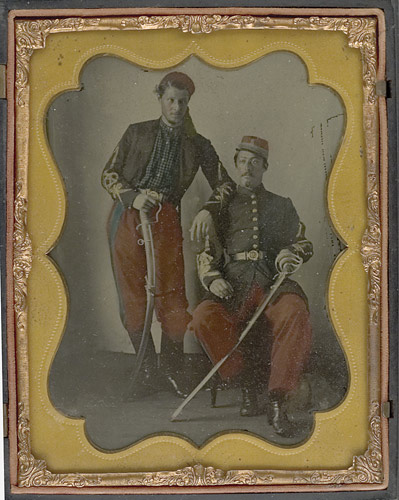John Westbrook at Antietam
28 August 2009
There are half a dozen unfinished posts waiting in the queue for this (very occasional) blog, but I am prompted to actually publish one at last by some fascinating email correspondence from Marianne Tierney, whose great-great-grandfather John Westbrook you see here. Marianne and her cousin Art Van Allsburg have collected and have shared some family treasures concerning their ancestor and Antietam.


John Westbrook (postwar, courtesy M. Tierney)
This photograph is magnificent, but more exciting is a letter written by Marianne’ s grandfather Van Allsburg in 1964 which recalls what he heard from his grandfather Westbrook firsthand. With it, and some other tidbits I’ve dug up, we can follow something of this soldier’s life through and following the catastrophic Battle of Antietam …
Gold from another mine
5 March 2009

M.A. and G.A.G. Coppens (1861, from Cowan’s Auctions)
This stunning piece is a rare image of two Louisiana Zouaves, one of whom was killed in action at Sharpsburg. It is among a trove of pictures of “my boys” I’ve harvested from the web in the last few days – thanks to Cowan’s, Heritage, and Museum Quality Americana auction houses.
I’ve ranted in the past about our history disappearing into the hands of private collectors (and it’s still a shame this stuff isn’t in public repositories), but I’m mostly reconciled to that. As long as firms like Cowan’s continue to make their archives of past sales available on the web, I think they’re acting in some ways as digital museums – and doing us a great service.
I’ll be pushing more than 20 of these new-to-me images of Antietam/Sharpsburg participants to AotW over the next few days. Among some of the most compelling is the lovely tinted half-plate ambrotype above, along with a crisp CDV and a mustering-out group photograph below …
US Regular Infantry in Maryland, 1862
24 February 2009
Officers of the US Regular Army units present on the Maryland Campaign of 1862 have a staunch advocate in one of our loyal readers. He has been poking me to make up for obvious deficiencies in my understanding of those present, as seen in the Antietam on the Web database.


Officers of the 14th US Inf. camp near Alexandria, Va., March 1862 (A. Gardner)
In addition to providing additional details for some of the officers we do cover on AotW, he’s also challenged me to add a number of men not yet listed. I fear I am not doing this fast enough to suit, but have had a rewarding weekend doing further research on the Regulars at Antietam and these new candidates of interest …
